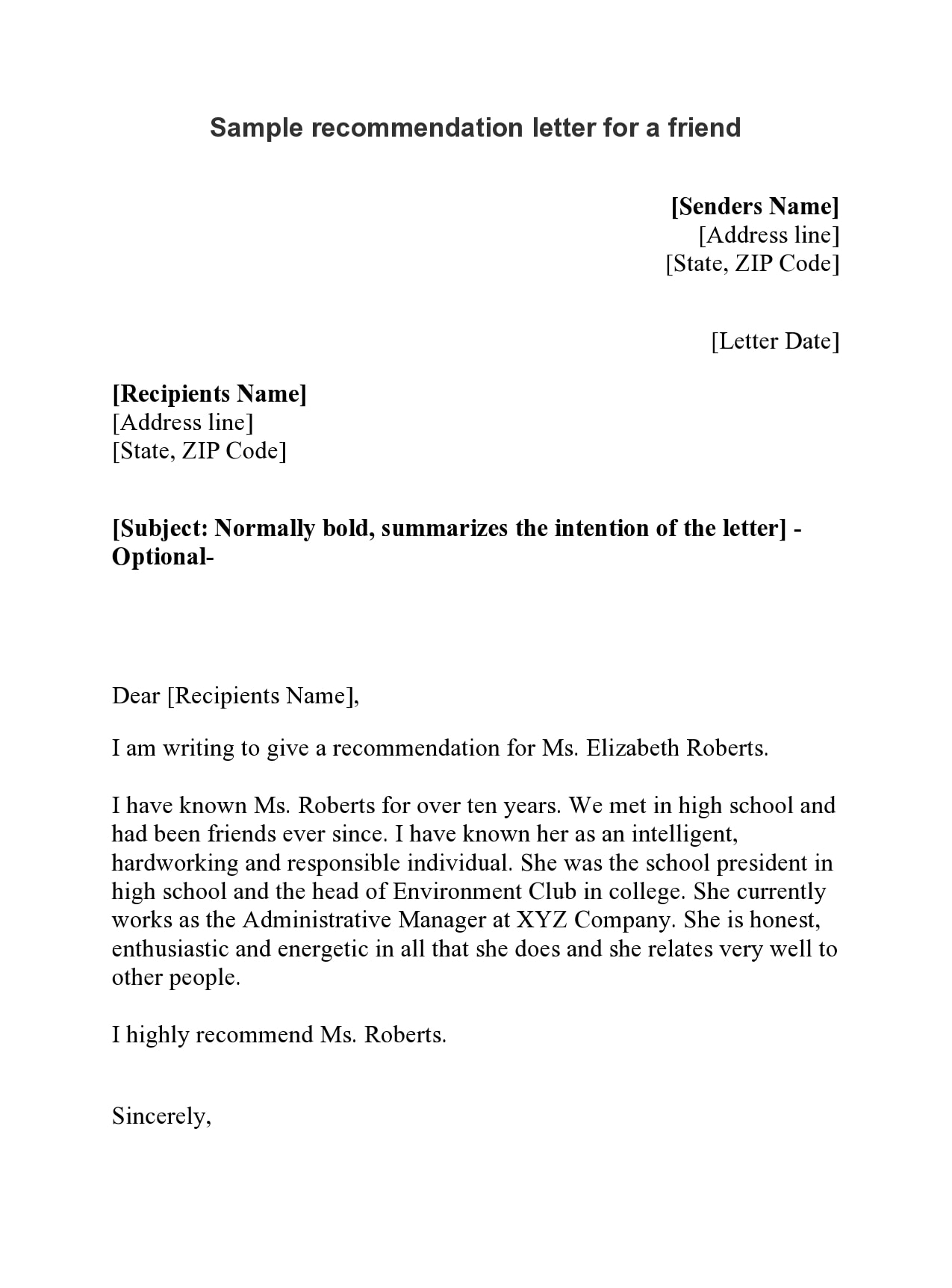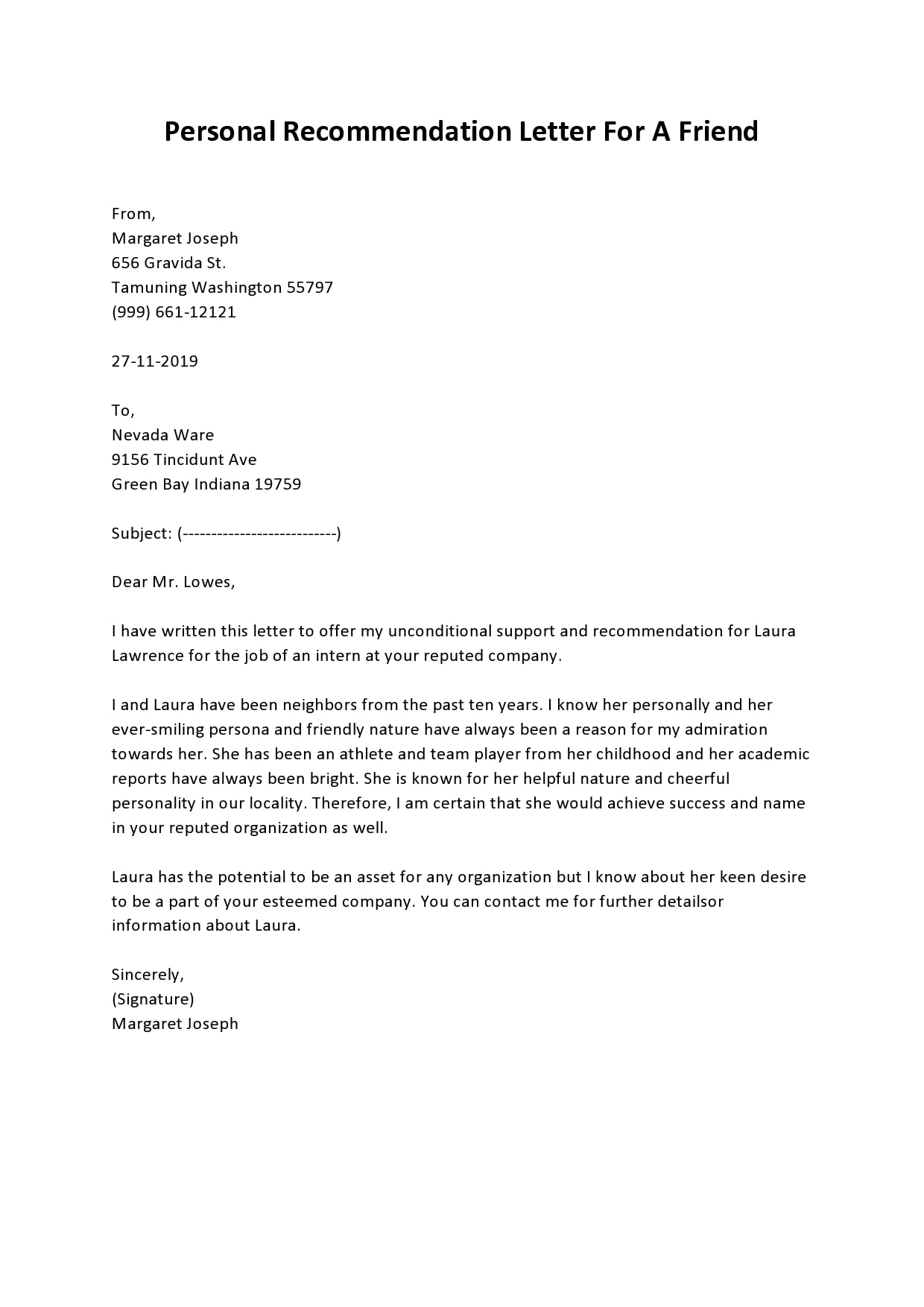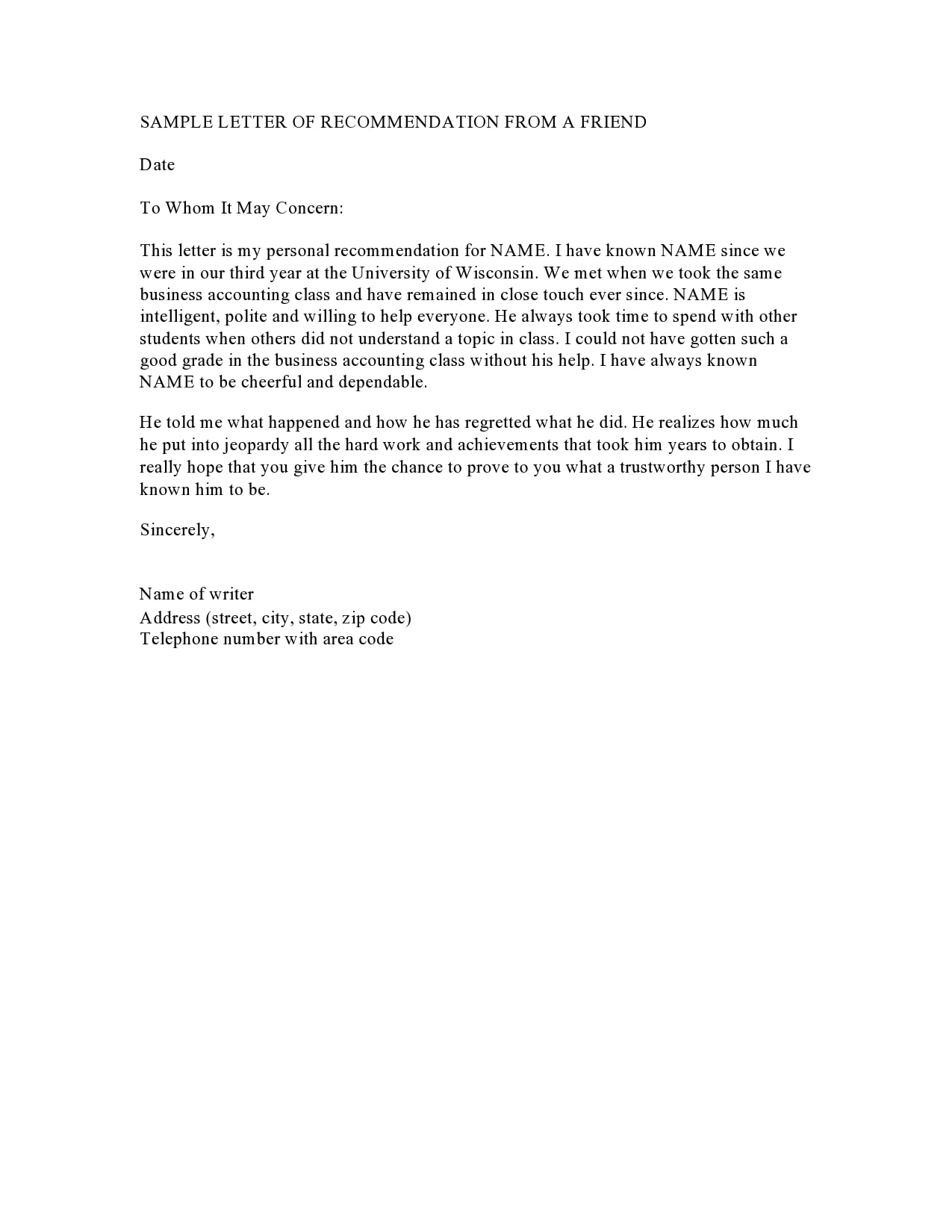Writing a thoughtful reference letter for a friend can feel like a really big deal, can't it? It's a truly meaningful way to show your support for someone you care about, especially when they are reaching for important life opportunities. Whether it's for a new job, getting into a school program, or even for something like a housing application, your words can make a genuine difference, you know? This kind of letter acts as a personal endorsement, giving a glimpse into the person your friend truly is, beyond just what a resume or application might say.
This guide is here to walk you through the process of putting together a compelling personal reference. We'll explore how to balance being professional with sharing your honest, warm insights about your friend. It's about helping you craft something that genuinely boosts their chances, really.
We'll look at everything from what to include to how to make your letter stand out. You'll find practical tips and helpful suggestions to make the writing process much easier. So, let's get into how you can create a powerful and supportive reference letter for a friend, which is that, a really helpful document.
Table of Contents
- What is a Reference Letter for a Friend?
- Why is a Personal Reference So Important?
- Getting Ready to Write: What to Ask Your Friend
- Key Elements of a Great Letter
- Practical Tips for Writing
- When to Write a Reference Letter
- Common Questions About Reference Letters
- Final Thoughts on Supporting Your Friend
What is a Reference Letter for a Friend?
A reference letter for a friend is, quite simply, a brief professional introduction for someone you truly trust or respect. It's also sometimes called a personal reference or a character reference, you know. This kind of document gives a summary of your own personal experiences with the person, covering their good characteristics and what they are good at.
Essentially, it's a personal recommendation document written from your own point of view. Its main goal is to help your friend with something important, like applying for a job, getting into a school, or joining a group. It really offers a unique look at who they are.
Many of us, it's almost certain, have had the chance to write a reference letter for someone. This could be for a friend, a student, or even a neighbor. It's a common request, and knowing how to do it well can be very helpful.
Why is a Personal Reference So Important?
A personal recommendation letter allows you to speak up for someone you know very well. It offers insights into their honesty, how hard they work, and what they might be capable of. These are things that often don't come across in a standard application, you see.
A professional reference letter, even when it's from a friend, can make a truly big difference in someone’s path. It does this by highlighting their good points, their work habits, and what they have achieved. For example, a strong letter can significantly influence whether someone gets a job, gets into graduate school, earns a scholarship, or secures a professional chance.
It adds a human touch to an application, providing a perspective that only someone who knows the person well can offer. It really helps the reader get a better feel for who your friend is as a person, which is quite valuable.
Getting Ready to Write: What to Ask Your Friend
So, the first thing you really need to do is ask your friend who the letter is being written for. It's pretty important to know the audience, isn't it?
Then, you should ask about their goals and what they hope to achieve with this letter. Discuss the background of what they are applying for. Knowing these details helps you make your letter much more helpful and on point.
It’s also a good idea to ask your friend for any specific qualities or experiences they want you to highlight. They might have a particular skill or a story that fits perfectly with what they are applying for. This makes your letter much stronger, honestly.
Key Elements of a Great Letter
Crafting a compelling reference letter for a friend involves including several key parts. Each part plays a role in making your letter effective and easy to understand. It's almost like building a good argument for your friend, in a way.
Starting Your Letter: Date and Salutation
Begin by writing the date on which you wrote the letter. This is a small but important detail. After that, use a clear greeting, such as "To Whom It May Concern," "Dear Sir," "Dear Mr.," "Dear Mrs.," or "Dear Ms." You should only use a single title if you are absolutely sure about the person's gender and marital status, you know.
If you happen to know the recipient's name, it's always best to address the letter directly to them, like "Dear [Recipient Name]". This makes the letter feel much more personal and direct, which is often appreciated.
Introducing Your Friend
In the opening paragraph, you should clearly state your relationship with the person you are recommending. Explain how long you have known them and in what capacity. For example, "I am writing to recommend [Friend's Name], whom I have known for [number] years as a close friend and former colleague." This sets the stage for your endorsement.
You want to give the reader a quick but solid idea of your connection. This helps establish your credibility as someone who can speak genuinely about your friend's qualities, you see. It's the foundation of your letter, really.
Highlighting Their Best Qualities
The letter should mention your friend’s best qualities, doing so honestly and briefly. Think about what makes them stand out. Is it their strong work ethic, their integrity, or maybe their kindness?
This is where you can share insights into their integrity, their approach to work, and what they are capable of. Writing a character reference letter for a friend can be a meaningful way to support them, and highlighting these traits is a big part of it. You want to paint a picture of their positive attributes, which is that, quite important.
For instance, you could talk about how they always follow through on commitments or how they approach challenges with a positive attitude. These specific examples make your points much more convincing, honestly. Learn more about character strengths on our site.
Balancing Tone: Professionalism and Warmth
When you write a recommendation letter for a friend, it’s important to find a good balance between a casual tone and keeping things professional. You want to use a clear, brief writing style and try to avoid too much informal language. It's a delicate dance, in a way.
Your goal is to sound supportive and genuine without sounding overly informal or like you're just chatting. The letter should feel warm and personal, yet still convey a sense of seriousness and credibility. This balance is key to making your letter effective, you know.
Closing Your Letter
In the closing part of your letter, you should summarize your recommendation. Reiterate your strong support for your friend and express your confidence in their abilities. Offer to provide more information if needed. For instance, "Please feel free to contact me if you require any further details."
End with a professional closing, such as "Sincerely" or "Regards," followed by your typed name and contact information. This ensures the recipient can easily get in touch if they have follow-up questions. It's the polite and professional way to finish, isn't it?
Practical Tips for Writing
Writing a glowing reference letter for your friend means paying attention to some practical aspects. These tips can help you make your letter truly impactful, which is that, quite helpful.
Being Honest and Concise
Always be honest about your friend's qualities. Exaggeration can actually hurt their chances. Keep your writing brief and to the point. Long, rambling sentences can make your letter less effective. The letter should mention the applicant's best qualities honestly and concisely, you see.
A clear, brief writing style is always preferred. Avoid unnecessary words or phrases that don't add value. This makes your letter much easier to read and understand, which is very important for the person reviewing it.
Using Anecdotes
Discover tips on structure, content, and personal stories to make your letter really stand out. A short, relevant story about your friend can show their qualities rather than just stating them. For example, instead of saying "they are responsible," you could tell a brief story about a time they took charge of a difficult situation.
These little stories make your letter much more memorable and convincing. They give the reader a real-world example of your friend's character in action. It's a powerful way to convey their strengths, honestly.
Formatting for Clarity
How to write a reference letter for a friend and what to include when you're writing a recommendation, with templates and formatting and writing tips, is something many people wonder about. Using a clear, easy-to-read format makes a big difference. This article will give you an overview of how to write a glowing reference letter for your friend and provide examples of how to format them.
Break your letter into short paragraphs, perhaps two to three sentences each. Use bullet points if you're listing several qualities or achievements. This makes the content much easier to scan and digest, especially for busy readers. A well-formatted letter looks professional and inviting to read, which is quite important.
When to Write a Reference Letter
Writing a character reference letter for a friend can be a truly meaningful way to support them during important life events. This includes things like job applications, legal matters, or even housing requests. It's a versatile document, in a way.
Whether it’s for a job application, getting into graduate school, a scholarship, or a professional opportunity, a strong letter of recommendation can significantly influence the outcome. Your friend might need this type of letter for various reasons, so it's good to be prepared.
The need for such a letter often comes up when your friend is trying to move forward in their life. Your support, offered through this letter, can be a crucial part of their success. It's a way of saying, "I believe in this person," which is very powerful.
Common Questions About Reference Letters
What should I include in a reference letter for a friend?
You should include the date, a clear salutation, your relationship with the friend, and how long you've known them. Most importantly, you need to mention their best qualities, perhaps with a short, honest story or example that shows these qualities in action. It's also good to include your contact information so the recipient can follow up, you know. This really helps the letter feel complete.
How do I begin a character reference letter?
Start with the date, then a polite greeting like "To Whom It May Concern" or "Dear [Recipient Name]" if you know it. The very first sentence should state your purpose, such as "I am writing to enthusiastically recommend [Friend's Name] for [the position/program/situation]." This gets straight to the point, which is usually appreciated.
Can a friend's recommendation really help with a job or school application?
Absolutely, yes! A well-written reference letter from a friend, also called a personal reference or character reference, summarizes your personal experience with the person, including their characteristics and skills. It provides a unique, personal perspective that can highlight aspects of their character, integrity, and work ethic that might not be obvious from other application materials. This human touch can often make a big difference in showing who the applicant truly is, which is very helpful.
Final Thoughts on Supporting Your Friend
Crafting a compelling reference letter for a friend is a thoughtful act of support. By using these examples as a guide, you can create a powerful and persuasive character reference letter that will truly help your friend. This guide, I’ll share my experience and provide you with three unique templates that you can use when writing a character reference letter for a friend. I’ll also offer tips from my own experience.
Remember, your words have weight. A strong, honest, and well-structured letter can provide that extra push your friend needs to reach their goals. It's a testament to your belief in them, and that's something truly special. You can also explore more general tips on writing reference letters from external resources.
So, take your time, think about your friend's best qualities, and put your genuine support into words. Your effort can really make a difference for them. And you can find more help on how to write these kinds of documents by checking out other articles on our site.



